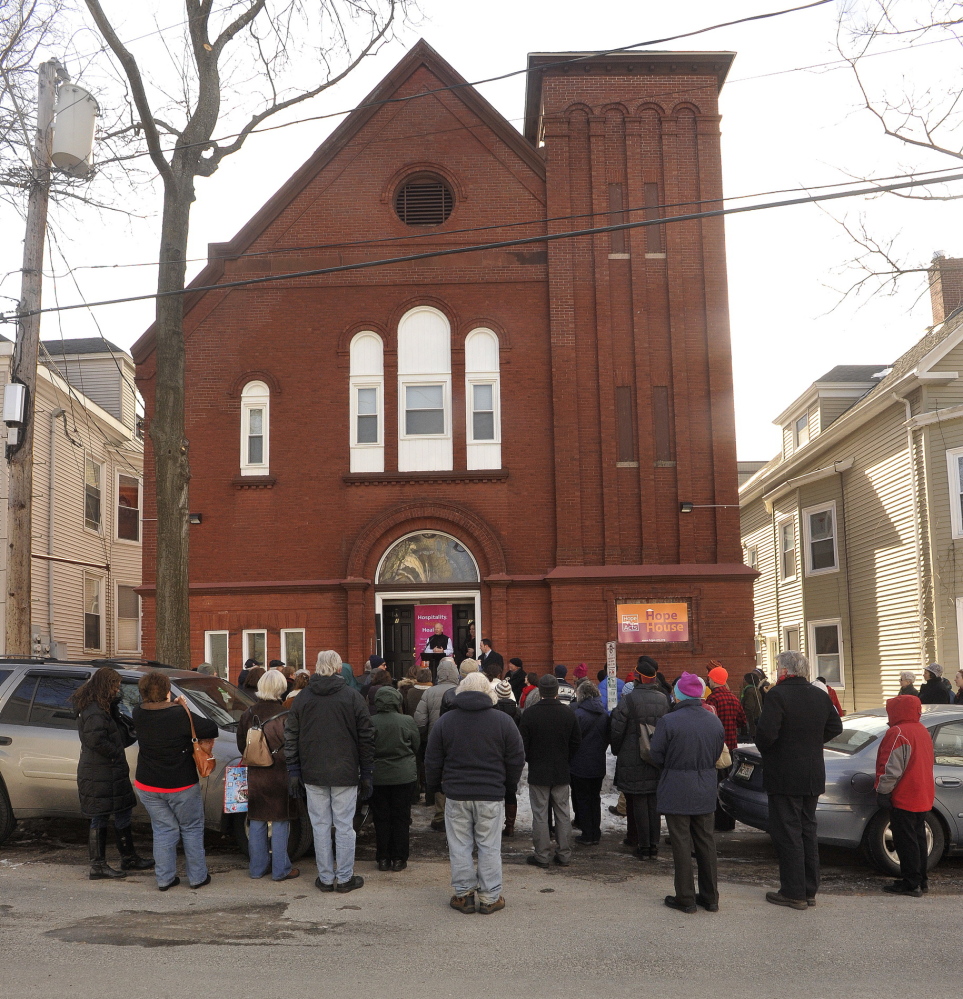The sparsely decorated apartment on Sherman Street could be any bachelor pad in Portland.
Cereal boxes sit on top of the refrigerator and loofahs are stuffed behind a grab bar in the shower.
But the three roommates, strangers until a few months ago, didn’t meet through friends or find each other on Craigslist. Their connection runs much deeper.
The men, and the 10 other residents of the apartment house, are asylum seekers from central Africa, navigating their new lives in America together.
“We left our family back home, but here we have found a new family,” said Armand Turinyungu, 39, of Burundi.
Turinyungu was one of more than 50 people who spilled out into Sherman Street on Tuesday morning to celebrate Hope House, a recently completed home and community center for newcomers who arrive in Portland alone and in need.
The building, a former Lutheran church and more recently low-income housing, was renovated into five apartments with a common space, where recent immigrants from Burundi, Rwanda and the Democratic Republic of Congo have been living since the fall.
Most of the residents are from Burundi and left families behind to escape violence and political unrest. The central African nation is one of the world’s poorest and has endured more than a decade of ethnic tension and civil war.
Asylum seekers come here on their own, not as refugees resettled by the federal government, and apply for protection in the United States to escape persecution or fear of persecution because of race, religion, nationality, political opinions or membership in a social group.
Asylum seekers are not eligible to take jobs until 180 days after they apply for protection. Portland provides General Assistance aid, including rent vouchers, to hundreds of asylum seekers, although the LePage administration has proposed eliminating state funding for that assistance.
Hope House was made possible by Richard Berman, a Portland developer and philanthropist who came up with the idea to create transitional housing for asylum seekers and offered to buy and renovate the building for Hope Acts, a nonprofit in Portland that provides support for immigrants and people recovering from addiction.
In addition to providing a place to live, the program helps the residents learn English, find jobs, get legal services and acclimate to American culture.
Since moving there in the fall, they have made a lot of progress.
In Turinyungu’s apartment on Tuesday, dirty pots topped the stove – an appliance none of them used in their communities in Africa, where cooking is done on charcoal and kitchens are outdoors.
Most residents have learned to use the burners, said Elizabeth Beane, the program coordinator for immigrant support. The oven is taking a little longer.
Rebecca Juma, 18, said her roommates, who are in their 30s, are teaching her to cook.
“They’re like my aunties,” said Juma, who came alone to the United States from Burundi.
Although she doesn’t like to talk about what life was like in her home country, she gushes when asked about Hope House.
“It’s beautiful,” she said, beaming.
Hugues Ingabire uses an even stronger word to describe his new home.
Like Juma, Ingabire, 21, left his family behind in Burundi and came to the United States to be safe. In August, he arrived in Portland, the home city of the only friend he had in this country.
He stayed with his friend while looking for an apartment but couldn’t come up with the money for a security deposit. Then he found out about Hope House.
“I got this beautiful apartment without a security deposit. It’s a miracle,” he said.
Ingabire, a roommate of Turinyungu, said all of the residents get together to watch movies and eat meals. They play the games that are stacked in a corner of the common area. His favorite is dominoes.
Much about his new apartment is different from his house in Africa, where there was no microwave and no stairs. The furniture was simpler at his home, he said.
“My African home,” he corrected himself. “This is my home now.”
Leslie Bridgers can be contacted at 791-6364 or at:
Twitter: @lesliebridgers
Send questions/comments to the editors.




Success. Please wait for the page to reload. If the page does not reload within 5 seconds, please refresh the page.
Enter your email and password to access comments.
Hi, to comment on stories you must . This profile is in addition to your subscription and website login.
Already have a commenting profile? .
Invalid username/password.
Please check your email to confirm and complete your registration.
Only subscribers are eligible to post comments. Please subscribe or login first for digital access. Here’s why.
Use the form below to reset your password. When you've submitted your account email, we will send an email with a reset code.